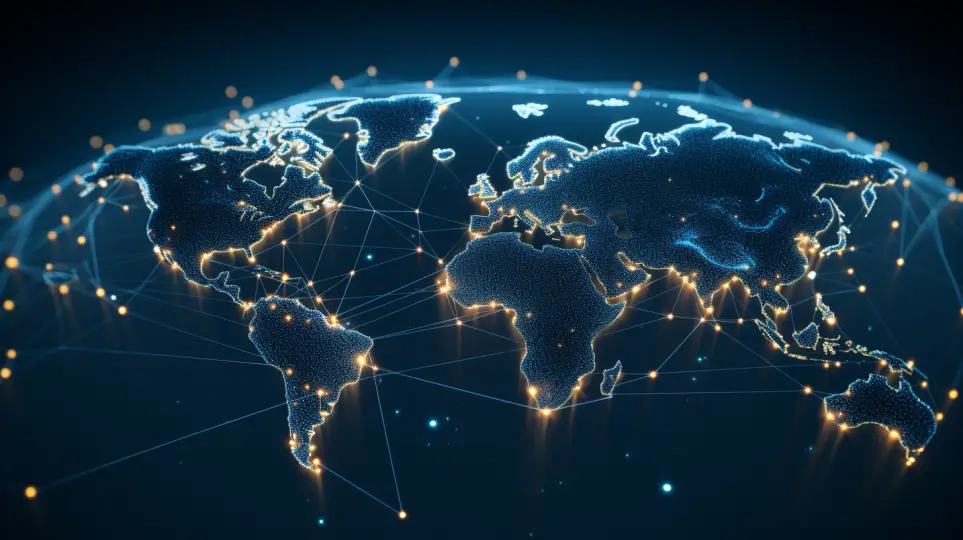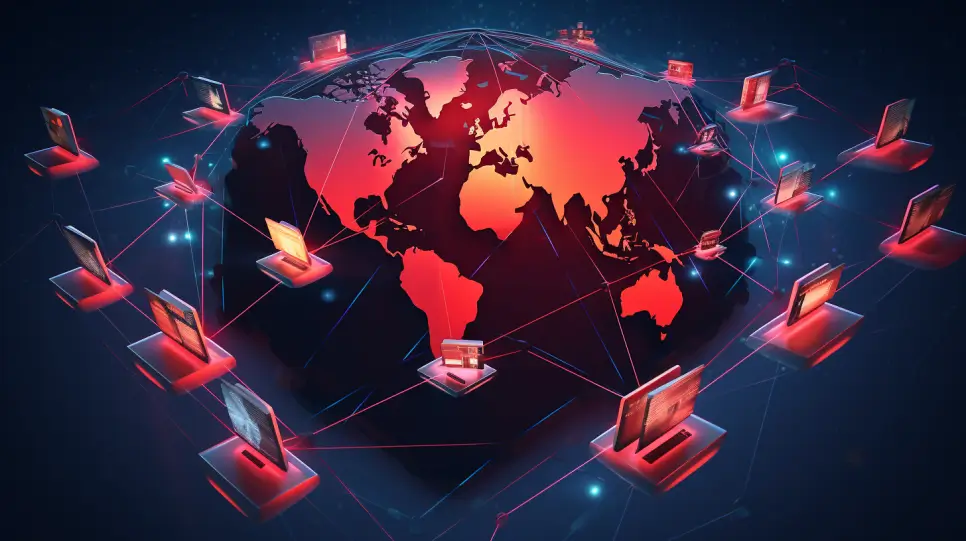A Study on the Global VPN Market in 2023
In a period when online tracking and surveillance have become the norm, and when cybercrime is at an all-time high, Virtual Private Networks (VPNs) are more relevant then ever before.
These tools will secure your connection, spoof your IP address, and help you remain anonymous at all times. They not only improve your privacy drastically but also mitigate some types of cyberattacks such as identity theft and data leaks.
The purpose of this study is to explore the size of the global VPN market in 2023, showcase important trends, analyze the biggest players in the market, and come to a pertinent conclusion on the topic.
Highlights:
- There are 4 main VPN types (consumer-grade, enterprise-grade, paid, and free)
- The most important elements of VPN services include speed, jurisdiction, encryption, VPN protocols used, Shared IPs, zero-logging policy, server coverage, killswitch, VPN obfuscation, scalability, access control and authentication, and customer support
- The VPN market was $44.6 billion in 2022, with an estimated $75.59 billion for 2027
- India has the largest VPN market size in the world
- North America has the largest VPN revenue share in the world
- Cisco AnyConnect has the highest market share (28.6%) out of all VPN technologies
- NordVPN had the highest test score in 2022 (4.8), followed by Surfshark (4.6)
- IPVanish had the highest download speed in 2022 (362.38 MB/s), even better than NordVPN (357.46 MB/s)
- 61% of the 1,007 respondents in the US weren’t using VPNs in 2022
- 47.7% more people started using VPNs at work in the US between 2019 and 2022
- 56.1% more people started using VPNs at home in the US between 2019 and 2022
- 45% more people started using VPNs both at home and at work in the US between 2019 and 2022
- 72% people in the US were aware of VPNs in 2020
- 85% of people in the US were aware of VPNs in 2021
- 88% of people in the US were aware of VPNs in 2022
- VPNs are illegal in 5 countries (Belarus, Iraq, North Korea, Oman, and Turkmenistan), heavily restricted in 3 countries (Russia, UAE, Uganda), and restricted in 5 countries (China, Iran, Turkey, Bahrain, and Cuba)
- Security is the main reason behind VPN adoption, with 43% of users offering this reason. Other reasons include streaming (26%), privacy (12%), accessing content (9%), travel (4%), gaming (3%), and work (3%)
- VPN adoption has also grown because of the growing awareness about cyber-threats and privacy concerns, the popularization of remote work, data protection law changes, and the constant development of new VPN technologies
- New VPN technologies include the WireGuard protocol, TLS 1.3 encryption, Multi-Protocol Label Switching Integration (MPLSI), Split Tunneling, and Zero-Trust Network Access
- Poor user experience is the most common challenge in VPN adoption globally in 2023
- The most common reason for why US users don’t use VPNs is because they don’t need one (59% of the respondents)
- The most conflicting aspects of VPN adoption is that users don’t immediately know why they should use VPNs, the low speed and common server disconnects, and the premium nature of good VPN services
- Future trends of VPN technologies include AI integration, decentralized VPN technology, edge computing VPNs, and 5G VPNs
Without further ado, let’s get started and see how the VPN situation looks on the ground!
Global VPN Market Overview

In 2023, VPNs aren’t much different conceptually than they were a couple of years ago. New features and technologies have emerged but the core idea behind a VPN remains the same.
It encrypts your internet connection, keeping your identity private and making you anonymous to other online actors.
There are four types of VPNs at a general level:
- Consumer-Grade – Used by individuals like you and me to enhance our data privacy and online security
- Enterprise-Grade – Used by enterprises to secure their internal communications, encrypt their data transfer, and enable enhanced protection for remote work
- Paid – Premium tools that provide top-tier anonymity and privacy features, alongside other accessibility perks
- Free – Significantly inferior variants of premium VPNs, with inferior data obfuscation capabilities, few anonymization features, and sparse accessibility perks
Each VPN type is designed to provide a different (and more specialized) experience. Let’s go into more details about each type below!
1. Consumer-Grade & Enterprise VPNs
Consumer-grade VPNs are the most common types of VPNs, dedicated to individuals who want to remain anonymous online, bypass geographical restrictions, mitigate Wi-Fi threats, and more.
Enterprise VPNs, on the other hand, are dedicated to businesses, organizations, and corporations who want to secure their internal networks and communications
When choosing a consumer-grade or enterprise VPN, there are several factors you should keep in mind:
- Speed – Every VPN slows down your internet connection but the best VPNs are unnoticeable in this regard
- Server Coverage – The more countries supported, the more geo-blocks you’ll be able to bypass. More servers also prevent server overload
- Security – For best protection, you’ll want the OpenVPN or IKEv2 VPN protocols. Other protocols are less secure and thus not advisable
- Zero-logging Policy – A good VPN will store no PII (Personally Identifiable Information) on its users
- Jurisdiction – A VPN’s jurisdiction can render its no-logs commitment null if its headquarters are located in a country with privacy-invasive laws
- Shared IPs – The more VPN users share the same IPs, the more indistinguishable and anonymous you are
- Killswitch – A tool that automatically shuts down your internet connection in case the VPN connection fails unexpectedly. This protects your IP from exposure
- VPN Obfuscation – They disguise the fact that you’re using a VPN, useful for country-wide anti-VPN firewalls like those in China
- Data Encryption and Confidentiality – Powerful encryption protocols to safeguard sensitive data, proprietary information, and other confidential data
- Access Control and Authentication – Enterprise VPNs may need advanced access control and authentication features to prevent unauthorized network access
- Scalability – Enterprises are expected to grow in time, and a good Enterprise VPN solution should be scalable, offering increased user load, more remote offices, and a higher volume of data transmission
- Technical and Customer Support – You need 24/7 customer assistance in case something breaks, especially for enterprise use
Not all VPN services are equal in these regards. You’ll have to do your research (or read a guide).
2. Paid vs. Free VPNs
Here at PrivacyAffairs, we’re against free VPNs because of one simple reason – a VPN costs money and resources to maintain. And where is that money coming from if the service is free?
If you’re not paying for the service, then you are the service. This means that free VPNs will collect your PII and sell it to advertisement companies. Or worse.
A premium VPN, on the other hand, has obligations to fulfill and rules to stand by. You’re paying for better security, improved anonymity, and enhanced privacy.
Premium VPNs also have a reputation to defend, which is the lifeline of their entire operations. A bad reputation leads to fewer people paying for their services, and thus smaller profits. That’s bad business.
VPN Market Size in 2023

The global VPN market has grown exponentially in recent years, which isn’t all that surprising. The entire cybersecurity industry has seen explosive growth, in part due to the unprecedented increase in cybercrime.
People are increasingly aware of how serious the situation is. VPN adoption and cybersecurity awareness have also increased accordingly.
Below, I’ll show you a couple of statistics and studies for a better understanding of the current VPN market!
Global VPN Market Size from 2019 to 2032
Thanks to a Statista survey conducted in March 2022, we have some preliminary data about the current size of the global VPN market from 2019 to 2027.
Here’s the chart:
| Year | Market Size |
| 2019 | $25.41 billion |
| 2022 | $44.6 billion (+75.52%) |
| 2026 | $77.1 billion (+72.87%) |
| 2027 | $75.59 billion (-1.95%) |
From 2019 to 2022, the VPN market had already grown by 75.52%, from $25.41 billion to $44.6 billion.
Another study by Precedence Research shows that the VPN market should be $59.73 billion in 2023. The same study estimates that, by 2032, the VPN market will grow up to $358.64 billion. If that forecast turns out to be true, it means the VPN market will grow by 500% over 9 years.
Interestingly enough, the global VPN market share is split quite unevenly between individual and commercial usage. Commercial VPN use accounts for 77% of the global revenue, while individual use only accounts for 23%.
This clearly shows that companies and enterprises are adopting VPN in large numbers, likely due to a growth in cybersecurity awareness and risks.
VPN Market Size in 2022 by Country and Region
In this next section, we’ll go over the VPN market size for several countries, as of 2022. Statista gives us a survey from March 2022 to use:
| Country | VPN Market Size |
| India | $11.64 billion |
| China | $9.9 billion |
| Indonesia | $4.14 billion |
| US | $2.7 billion |
| Brazil | $1.6 billion |
| Philippines | $1.22 billion |
| Turkey | $950 million |
| Russia | $880 million |
| Mexico | $860 million |
| Vietnam | $860 million |
| Thailand | $710 million |
| Germany | $630 million |
| Egypt | $600 million |
| UK | $500 million |
| Saudi Arabia |
$480 million |
As of 2022, India is the leader in the VPN market, with a market size of $11.6 billion. China comes a close second with $9.9 billion in market size.
The US is only on 4th place with $2.7 billion but it’s to be expected. China and India have much bigger populations to account for all that VPN usage.
Here’s the VPN revenue share by region as of 2022:
- Asia Pacific – 26%
- North America – 37%
- Europe – 29%
- Latin America – 5%
- MEA – 3%
It seems that, in terms of market share, North America is on first place this time, with 37%, followed by Europe with 29% and then Asia Pacific with 26%.
However, according to recent metrics, VPN services and solutions are quickly spreading across India, China, and other Asian countries. So, we can safely assume that Asia Pacific will have the highest increase in VPN market share in the coming years.
Market Share of Leading VPN Technologies as of 2022
Several VPN technologies have become increasingly popular among individuals and companies like. A 2022 Statista survey shows us the market share of these VPN technologies:
| VPN Technology |
Market Share |
| Cisco AnyConnect |
28,6% |
| Cisco VPN |
25.51% |
| Juniper VPN |
10.62% |
| Citrix Gateway |
8.1% |
| OpenVPN |
5.31% |
| Other |
21.86% |
Let me explain what these technologies are and what they do:
- Cisco AnyConnect – Enables remote access to the company’s network via an encrypted VPN connection
- Cisco VPN – A specific VPN service for enterprises focusing on remote access and increased flexibility
- Juniper VPN – Another specific VPN service that uses an SSL-VPN application to provide a secure and protected connection to network resources
- Citrix Gateway – A remote access VPN infrastructure that provides single sign-on throughout all apps via a single URL
- OpenVPN – The most secure VPN protocol used by most reputable VPN services around the world. It’s the golden standard in VPN technology
Now that you know what they are, you can appreciate the fact that Cisco AnyConnect has the highest market share out of all VPN technologies.
Enterprise-level VPN technologies are still the most used around the world due to the need for increased security and protection at an organizational level.
VPN Usage in the US in 2022
Let’s take a closer look at VPN usage in the US. The statistic below is accurate as of November 2022, so a bit over a year ago.
Here’s what the situation looked like back then:
| Trend |
Value |
| Don’t Use VPN (or unaware of them) |
61% |
| Use VPNs for business and personal reasons |
9% |
| Use VPNs for business only |
13% |
| Use VPNs for personal reasons only |
17% |
Disclaimer – This statistic is based on a survey that analyzed the responses of 1,007 in the US, so it’s not reflective of the entire US population.
According to the statistic above, 61% of all the respondents in the US either weren’t using VPNs or weren’t aware what they were.
Only 17% were using VPNs for personal reasons, why 13% of the respondents were using them for business purposes.
These numbers aren’t especially low but it does show that the majority of the respondents didn’t have enough cybersecurity awareness. This is quite worrying, though I suspect those numbers are constantly growing. The situation should be markedly better in 2023.
I’ll also show you the VPN usage in the US based on location:
| Year | At Work |
At Home | Both Work and Home |
| 2019 |
15.3% | 22.9% | 26% |
| 2020 |
17% | 27.9% | 16.5% |
| 2021 |
61% | 78% | 69% |
| 2022 |
63% | 79% | 71% |
Disclaimer – Disclaimer – This statistic is based on a survey that analyzed the responses of 1,000 in the US, so it’s not reflective of the entire US population.
Just by looking at the table above, we can see that the rate of people using VPNs has grown significantly over the years.
Between 2019 and 2022:
- 47.7% more people are using VPNs are work
- 56.1% more people are using VPNs at home
- 45% more people are using VPNs both at home and at work
The situation on the ground is looking extremely good when you do a comparative analysis over the years. While total number of people using VPNs in the US is low, that number has grown significantly in the last couple of years.
The same goes for VPN awareness from 2020 to 2022:
- 72% in 2020
- 85% in 2021
- 88 in 2022
That number is growing, which shows that people are becoming more educated in cybersecurity. That’s always a good thing because even if they don’t start using these tools right away, they know that they can rely on them if they ever need more privacy.
Key Market Players

The VPN industry is populated with countless names that define the niche. As with every other industry, it has its host of major players. These are the reputable VPN services that everyone knows to be the golden standard in the industry.
Below, I’ll give you several stats about the most popular VPNs worldwide, a comparison between them, and a quick summary of each one.
Best VPNs Worldwide in 2022, by Test Score
First, we’ll see which VPN services are the most qualitative based on their test scores. Statista saves us once again with a survey performed in July 2022:
| VPN |
Test Score |
| NordVPN |
4.8 |
| SurfShark |
4.6 |
| PrivateInternetAccess (PIA) |
4.5 |
| Proton VPN |
4.3 |
| TorGuard |
4 |
| PureVPN |
3.9 |
| Windscribe |
3.8 |
| CyberGhost |
3.5 |
| AirVPN |
3.5 |
| Ivacy VPN |
3.4 |
According to this survey, NordVPN still ranks as the best VPN service in the world. That’s also what we found based on our analyses in the industry.
SurfShark comes in a close second place with a score of 4.6, which is really nice to see. A couple of years ago, SurfShark still had a few issues to deal with in order to reach platinum status.
But as of Q2 2022, SurfShark climbed all the way to second best-rated VPN in the world. That’s an astounding improvement across the board, and one of the better stories we’ve seen this year.
We also couldn’t recommend anything else but these two, since they’re reliable, fast, effective, and affordable above all.
Fastest VPNs Worldwide in 2022
Now, instead of ranking them based on overall capabilities, we’ll look at speed and see which are the fastest VPNs in the world:
| VPN |
Download Speed |
Upload Speed |
| IPVanish |
362.38 MB | 34.52 MB |
| NordVPN |
357.46 MB | 35.15 MB |
| Windscribe | 332.48 MB | 34.25 MB |
| TorGuard | 311.44 MB | 33.27 MB |
| CyberGhost | 299.14 MB | 34.51 MB |
| VPN Unlimited |
282.27 MB | 35.22 MB |
| Express VPN |
279.77 MB | 31.27 MB |
| Hotspot Shield |
259.52 MB | 36.46 MB |
| Private Internet Access |
129.51 MB | 35.14 MB |
| Surfshark |
45.01 MB | 34.85 MB |
According to speed alone, it seems that IPVanish comes out on top, with the best download speed out of all 10 VPNs listed above.
However, NordVPN has a better upload speed, while somewhat cancels out IPVanish’s advantage, though not by a lot.
Interestingly, Surfshark is the worst on this list, with a measly 45.01 MB download speed and 34.85 MB upload speed.
If you remember, in the previous statistic, Surfshark came out in second place based on user scores. So, it seems that users aren’t very bothered by the low download/upload speed.
Countries Where VPNs Are Illegal

VPNs aren’t accepted nor condoned in every country. In fact, some places around the world make it illegal to use VPNs to connect to the internet. Others are more permissive and only impose restrictions on VPN use.
Let me show you which countries I’m talking about:
| Country |
VPN Status |
| Belarus |
Illegal |
| Iraq |
Illegal |
| North Korea |
Illegal |
| Oman |
Illegal |
| Turkmenistan |
Illegal |
| Russia |
Heavily Restricted |
| UAE |
Heavily Restricted |
| Uganda |
Heavily Restricted |
| China |
Restricted |
| Iran |
Restricted |
| Turkey |
Restricted |
| Bahrain |
Restricted |
| Cuba |
Restricted |
This survey was conducted in March 2022 and it shows that VPNs were currently illegal in 5 countries, heavily restricted in 3 countries, and restricted in other 5 countries.
It’s unclear what the distinctions are between “restricted” and “heavily restricted” but it most likely involves the use-case scenarios of VPNs.
In most cases, countries will ban VPN user because they rely on censorship and pervasive surveillance to control their citizens. VPNs would allow citizens to escape restrictions, obtain uncensored information, and be freer.
A state who controls what its citizens are allowed to know can control how and what they feel about every important aspect of their lives. Heavy censorship is often accompanied by propaganda to really send it home.
Take China, for instance. Its “Great Firewall” is one of the most sophisticated censorship tools in the modern world. Every year, the country dedicates large portions of its GDP for domestic surveillance, censorship, and freedom limitation.
Officially, only government-licensed VPNs are allowed, even though regular VPNs aren’t technically illegal. However, Chinese citizens can’t access the normal social media platforms like Facebook or Instagram.
They have their own internet and social media platforms, and citizens aren’t allowed to access foreign sites through VPNs. Even as a tourist in the country, you should be careful about VPN usage.
Factors Driving Market Growth

The VPN market has been growing constantly in recent years, as I’ve shown above. But why, exactly? It’s not as simple as people growing more aware about cybersecurity risks.
First, I’ll show you the main reasons behind VPN adoption worldwide as of 2022:
| Reason |
Share of Users |
| Security |
43% |
| Streaming |
26% |
| Privacy |
12% |
| Accessing Content |
9% |
| Travel |
4% |
| Gaming | 3% |
| Work |
3% |
The vast majority of VPN users (43%) invoked “security” as the number one reason behind adopting VPN technology. This confirms the previous data, namely that people have become more aware of the risks and have decided to improve their online security.
The second most popular reason for VPN usage is streaming, which does make sense. Many streaming services are geographically locked, and people living under geo-blocked countries will have to use VPNs to access these services.
It’s interesting to see the “privacy” is still less important than “streaming” on the list of reasons. Sadly, this shows that people aren’t necessarily more interested in keeping their online presence private and remaining anonymous.
Now, let’s go through a more detailed list of reasons for VPN adoption:
1. Growing Awareness
A primary reason for the growth of the VPN market is the increasing awareness about privacy concerns and cybersecurity threats:
- Cybersecurity Threats
Cyberattacks have become much more common, sophisticated, and and dangerous. Both malware and phishing attacks, which account for the majority of cyberattacks, have increased in number in recent years.
This phenomenon has led individuals and enterprises to realize the importance of online security. Identity theft and data theft cases made it necessary to adopt VPN technology as a way to protect your most sensitive data.
- Privacy Concerns
Slowly but steadily, people are realizing the importance of online privacy and anonymity. They’re becoming conscious of the dangers of online tracking, surveillance, and profiling.
VPNs are a natural solution to this – they can mask your IP address, encrypt your connection, and anonymize your traffic. You won’t be 100% anonymous because that concept is unachievable online, but it’s better than nothing.
2. Popularization of Remote Work
Due to the COVID-19 pandemic, companies around the world have transitioned to remote work for their employees. To improve efficiency and security when accessing company networks remotely, organizations began using VPN solutions.
Even now, after the pandemic is over, workers haven’t yet transitioned back to office work. It seems that the remote work trend has caught on, and so the VPN market went through a natural expansion.
Many companies also began offering more flexible work arrangements on their contracts, which requires secure remote connectivity and data privacy. Hybrid work models have become more popular, and employees need to access work resources seamlessly.
The answer – VPN solutions.
3. Geopolitical Factors
The expansion of the VPN market is also due to geopolitics. Here’s what I mean by that:
- Surveillance and Censorship
There will always be people who won’t accept living under oppressive censorship regimes and accept non-stop surveillance of their private lives.
Slowly, more and more people have started seeking solutions to these issues. And VPNs were a natural refuge for all the political dissidents and citizens living under oppressive regimes.
- Corporate Concerns
Businesses who operate in geopolitically sensitive locations will have security concerns and elevated data privacy risks due to the unique cybersecurity challenges they’re facing.
When operating in these locations, VPN solutions are a must. They’ll encrypt corporate networks, protect PII, and enable operations in regulatory environments
- Access to Global Markets
As they’re growing, companies will want to expand their reach to new markets and locations with different privacy laws and security risks. To provide secure access to their corporate networks from these locations, companies will employ VPN solutions.
They allow companies to create reliable international collaborations between their offices without giving up security and privacy.
4. Data Protection Law Changes and Other Regulations
Europe is one of the leading actors in VPN usage, and one reason for that is the regulatory changes in data protection laws. The GDPR has recently introduced several new regulations in August 2023 that will drive many more companies to VPN solutions.
This isn’t the first time the GDPR has done this, either. Whether it’s new cross-border data transfer regulations or new privacy regulations, companies operating in the EU have had to tackle many challenges.
VPNs improved the confidentiality of their communications, made them compliant with the new privacy regulations, and helped them stay on top of international data transfers without breaking any laws.
5. VPN Technology Is Evolving
Another good reason for the expansion of the VPN market is that the technology has been evolving rapidly in recent years.
Some of these technologies include:
- WireGuard Protocol – WireGuard is designed to replace OpenVPN, so it has faster connection times, improved cryptography, and it’s also open-source
- TLS 1.3 Encryption – Faster and more secure than its predecessor, being less vulnerable to cyberattacks, and cutting down on latency
- Multi-Protocol Label Switching Integration – Improves network scalability and efficiency, and offers a more dedicated and reliable connection. It’s perfect for enterprises who have strict performance requirements
- Split Tunneling – Optimizes bandwidth usage, offers more flexibility, and reduces the load on the VPN connection by splitting the traffic through the VPN and the ISP
- Zero-Trust Network Access – Verifies the identity of the users who connect to the VPN network before granting them access to resources and applications
Due to the fast-paced development of such technologies, VPNs have become much more popular for individuals and businesses alike. Enterprises have shifted to VPN solutions to encrypt their communications, enable remote work functionalities, and maintain data privacy intact.
Challenges and Barriers

After seeing why VPN adoption has increased, we should also look why people aren’t using VPN technology. It’s important to reveal the challenges and barriers that people deal with in order to boost adoption.
Let’s see the most common global challenges in VPN adoption as of 2023:
| Challenge |
Share of Users |
| Poor user experience (slow or frequent disconnects, etc.) |
32% |
| High costs (maintenance, licensing, infrastructure, etc.) |
14% |
| Difficulty integrating with other systems and services |
13% |
| Complex management and administration |
12% |
Almost a third of all respondents (381 respondents in total) say that the bad user experience is why they don’t use VPNs. Things like slow connections or frequent disconnects are the number one issue people have with VPN services, it seems.
Then, moving on to the company side of things, VPN services complain about the high costs associated with VPN upkeep (14%). Maintenance, licensing, and infrastructure costs are too high, which presents a significant challenge for VPN services.
Companies will have to find a way to solve the connectivity issue, though. It’s the biggest hurdle to overcome and the most annoying issue that clients deal with, as of 2023.
Main Reasons for not Using VPNs in the US in 2022
A Statista survey from November 2022 shows us the most common reasons for not using VPN services in the US. Let’s take a look:
| Reason |
Share of Users |
| Don’t need one |
59% |
| Too expensive |
22% |
| Too much trouble to set up |
21% |
| Unsure of the benefits |
20% |
| Don’t trust that they’re secure |
7% |
| Can’t access the sites I’d like to |
3% |
| Speed issues |
1% |
Disclaimer – This survey is based on 1,007 respondents and their opinions. It does not reflect the entirety of the US population.
59% of the 1,007 US respondents say that they don’t need a VPN, and that’s why they don’t use it. That’s a fair opinion and, for the most part, regular people don’t generally need it.
Only when you’re preoccupied with your online privacy or you want to bypass some geo-blocks will you use a VPN, in most cases.
But the number of people who’re using it purely for the privacy is still low. This is likely caused by the disinterest in protecting their online identity and remaining anonymous. These tools don’t have a clear and visible benefit right away.
Around 22% of people say that VPNs are too expensive, while 21% say they’re a hassle to set up, and 20% aren’t even sure what VPNs do.
I’d say that this last part is more important – a large number of people aren’t aware of VPNs or what they do. This lack of education makes users vulnerable to data leaks and being manipulated online.
Conflicting Aspects of VPNs
VPN adoption has increased significantly recently but still, many people are conflicted about these service. Here’s why I think that is:
- Benefits are not immediately clear
This is the “killer” aspect, in my view. The benefits of VPNs aren’t immediately understood and acknowledged by people.
“So what if they encrypt your traffic and make it so you’re more anonymous? Why would I want that and what does that even mean?”
I’ve heard this way too many times to discount it as an unpopular opinion. The truth is that there are many people with a low understanding of data privacy, cybersecurity risks, and privacy awareness. These people don’t see the benefit of VPNs because they don’t necessarily care about being more anonymous.
VPNs should talk about why users should stay private online and why they should care about anonymity. A helpful blog section detailing these questions would go a long way to improving VPN adoption.
- Low speed and disconnects
Let’s make one thing clear – all VPNs slow down your internet connection. But the best ones are unnoticeable and give you top speed.
However, the vast majority of users notice the decrease in speed and it puts them off instantly. Comfort is a big factor for most people, and if a page takes 20% longer to load because of the VPN, they’ll stop using it.
There’s also the disconnect problem. Many users complain about being disconnected from the VPN servers randomly or that it takes too long to connect. This lack of reliability and speed is another no-no for VPNs.
- Costs
This is closely related to my first point – lack of acknowledgment and understanding about the benefits of VPNs. If people don’t really know how VPNs can help them, why would they pay for them?
The solution to this is simple – raise awareness about the benefits of VPNs and why online privacy is important, and people will be more liable to pay for VPN services.
Until then, VPN adoption will be slow, albeit constant. I still think VPN companies could do better in terms of educating users about the benefits of VPNs.
Future Trends and Projections

The VPN industry is constantly evolving, researching new features and advancing its existing ones to provide a better user experience. In this section, I’ll take you through a journey in some of the yet-to-be-achieved objectives of the VPN industry.
1. AI Integration
One of the highly sought-after dreams of VPN creators is to find a way to integrate Artificial Intelligence and Machine Learning in VPN services.
This integration could allow VPNs to analyze network patterns, optimize the connection in real-time if it slows down, and even predict cyberattacks or threat actors. The technology would be adaptive on the fly and make the best decisions for the end-user.
2. Decentralized VPNs
Decentralized VPNs are a new concept in the industry. Essentially, they’re peer-to-peer networks that leverage blockchain technology to provide superior encryption capabilities to the network.
Since there are no more central servers, these VPNs are faster, more secure, and more private. There’s also a much lower risk of data breaches because there are no central servers to infiltrate.
Users can also share their internet bandwidth with other users without compromising their safety. The decentralized network would ensure all of this happens seamlessly and securely.
3. Edge Computing VPNs
Using edge computing, VPN technology can get even faster, with lower latency, and employ even better security protocols due to the nature of edge computing.
Simply put, edge computing changes the focus of data production, interpretation, and management. Traditionally, data would be stored and interpreted on a central server.
With edge computing, IT engineers would build multiple data centers and move them closer to where the data is generated (end-user locations). This would help improve remote computing, make the data flow much faster, and eliminate several cybersecurity vulnerabilities associated with central data storage.
4. 5G VPNs
The emergence of 5G technology brings yet a new development path to VPNs – migrating to 5G networks. This would allow them function at high-speeds with a much lower latency, and offer more security on mobile devices.
Other emerging technologies like VR and AR would also become compatible with VPNs, which would greatly increase the adoption rate for individuals and businesses alike.
5G connections would greatly alleviate the speed and connectivity issues, for the most part. That would eliminate some of the most common complaints regarding VPN use.
Conclusion
According to the current data, VPN adoption is increasing, cybersecurity awareness is growing, and people are more careful with their data than ever before.
The VPN market was $44.6 billion in 2022, with an estimated $75.59 billion for 2027, so the prospects are looking really good. With AI and Machine Learning technologies advancing so much recently, VPNs are bound to improve in the coming years, too.
While there are still challenges to struggle with, VPN services are evolving as we speak. Until then, PrivacyAffairs will keep you up-to-date with everything cybersecurity-related!
Sources
Statista – Size of the Virtual Private Network (VPN) Market Worldwide from 2019 to 2027
Precedence Research – Virtual Private Network Market
Statista – Virtual Private Network (VPN) Market Worldwide in 2022, by Country
Statista – Leading Technologies’ Share in the Virtual Private Networks (VPN) Software Market Worldwide in 2022
Statista – Virtual Private Network (VPN) Usage in the United States in 2022
Statista – Virtual Private Network (VPN) Usage in the United States from 2019 to 2022, by Location
Statista – Virtual Private Network (VPN) Awareness in the United States from 2020 to 2022
Statista – Best VPNs Worldwide in 2022, by Test Score
Statista – Fastest Virtual Private Networks (VPNs) Worldwide in 2022, by Average Upload and Download Speeds
Statista – Countries Where VPN Usage Is Limited in 2022
Statista – Main Reasons for VPN Usage Worldwide in 2022
Privacy Affairs – Have Malware Attacks Become More Common?
Privacy Affairs – Why Is Phishing So Common & How to Protect Against It?
Segment – Four Recent GDPR Changes Your Business Needs to Know About
Statista – Most Important Virtual Private Network (VPN) Challenges Worldwide in 2023
Statista – Main Reasons for Not Having a Virtual Private Network (VPN) for Personal Use in the United States in 2022

